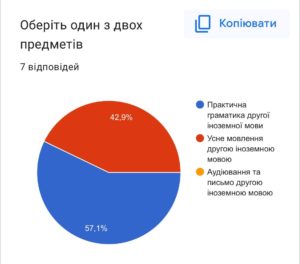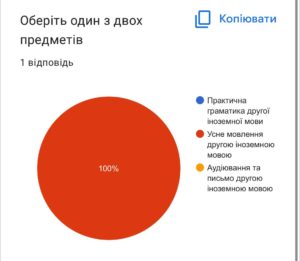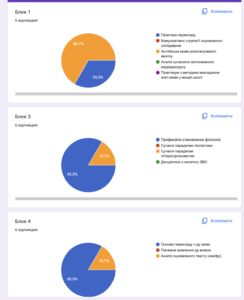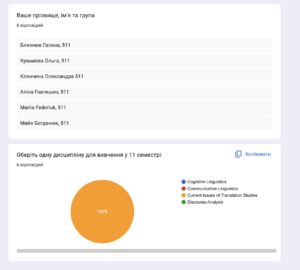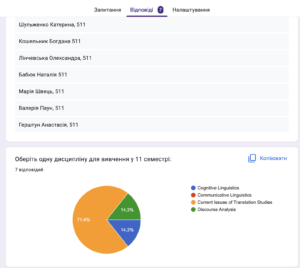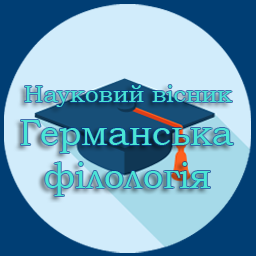Дисципліни вільного вибору
Освітня програма: Англійська мова і література та друга іноземна мова
Анкета для голосування: https://forms.gle/eJ7R1cMpiUzGS2A36, https://forms.gle/z8QqCydXJgtmyu7i8
Результати голосування:
Анкета для голосування: https://forms.gle/8joQC3Z3456DeVap9
ВБ 1.1 – 1.2 – 1.3 – 1.4
| ПРАКТИКА ПЕРЕКЛАДУ
Викладач: к.ф.н., доц. Сапожник І.В. 3 кредити; залік Course description: The practical course “Translation Practice” aims to provide students with knowledge of the characteristic features of interpretation and translation and its reproduction in Ukrainian-English and English-Ukrainian translations. The course aims to study the lexical, grammatical and structural aspects of typical translation transformations. This course is aimed at developing the translation skills needed to translate conferences, lectures, videos, etc. into Ukrainian and English. It also provides students with a comprehensive mastery of language and speech competence in English, their acquisition of knowledge in the field of philological sciences. The structure, content and sequence of the textbook material allows combining the acquired knowledge and skills in English with the training of philologists. After completing the following course, a student will be able to translate bilaterally (from English into Ukrainian and from Ukrainian into English) texts related to socio-political, economic and legal fields, orally (consecutive translation and translation from a sheet) and written forms. Furthermore, a student will acquire: the main concepts of socio-political, economic and legal industries; socio-political, economic and legal terminology, its meaning and scope; typical problems that arise during industry translation; types of translation and means of achieving the transmission of the content of the message in a foreign language by means of the native language and vice versa in the socio-political, economic and legal spheres. Course books: О. В. Ребрій. Основи перекладацького скоропису. Навч. посіб. для студентів вищих закладів освіти. За редакцією Л. М. Черноватого та В. І. Карабана.Вінниця 2006. Шпак В. К. Основи перекладу: граматичні та лексичні аспекти. Навч. посіб. 2-е вид. Київ 2007. Основи перекладацького скоропису / Ребрій О. В. |
КОМУНІКАТИВНІ СТРАТЕГІЇ ІНШОМОВНОГО СПІЛКУВАННЯ Викладач: к.ф.н., доц. Сапожник І.В. 3 кредити; залік Course description: Протягом вивчення курсу “Комунікативні стратегії іншомовного спілкування” у студентів формуються професійні уміння та навички створення та використання мультимедійних презентацій з застосування знань на практиці в нестандартних умовах, зміненій ситуації, що активізує здібності студентів аналізувати, узагальнювати, оцінювати інформацію, яка відбирається для презентації, а також виховуються потреби систематично поповнювати свої знання і творчо їх застосовувати в практичній діяльності в сфері своєї майбутньої спеціальності. Мета навчальної дисципліни: тренування навичок та умінь створення та використання мультимедійних презентацій в процесі ділового спілкування.
|
| Англійська мова різногалузевого вжитку
Викладач: к.ф.н., доц. Бешлей О.В. Credits: 3 Number of class hours: 30 Type of assessment: continuous + pass/fail exam Course description: Professional English in Use with a special emphasis on Management and ICT is a new two-module skills-based course designed specifically for English language undergraduates who are about to enter the job market and need to bridge the gap between classroom and work of their choice. Focusing on receptive skills (reading and listening) to activate productive skills (speaking and writing) will help learners make measurable progress while making them more employable. Capacity building, technology integration and skill taxonomy implementation have become cornerstones of the blended classrooms and hybrid workplaces of today. The course offers a variety of topics ranging from Management and Motivation to Software Engineering and Analyzing Numbers and Quantities. These will be of special interest and value for those learners seeking to capitalize on the much sought-after softer skills, such as teaching how to lead, working in teams, collaboration, communication, and thinking strategically. Don’t miss your chance to join the Professional English in Use course today! Course book: English for Business Studies, 3rd edition |
Аналіз сучасного англомовного медіадискурсу
Викладач: к.ф.н., доц. Бешлей О.В. Credits: 3 Number of class hours: 30 Type of assessment: continuous + pass/fail exam Course description:
The aim of the course is to develop students’ creative and critical thinking skills and abilities to analyze the specifics and potential of various means of influencing the audience, used in different types of media texts. Students learn about how the speech behavior of famous people, members of the media affects society; how language serves as a tool for constructing public opinion; how to navigate the information around and how to recognize the subjective interpretation of events and phenomena, propaganda. The specificity of the course is its focus on a pragmatic approach to the analysis of various media resources, both past and present, in order to form an unbiased attitude to events covered in the media, as well as to better understand the functionality of influence and manipulation of readers and viewers. The tasks of the course are: ● to enable students to implement knowledge in the fields of advertising, news, analytics, journalism; ● to raise understanding of media texts; ● to improve students’ business and everyday communication skills; ● to give students the opportunity to gain the necessary knowledge to prepare their own speeches, news or advertising. The students will have a chance to cover the following topics: ● Media literacy: key concepts ● Representation, biases and stereotyping ● Visual literacy ● Advertising Techniques ● Fake news and deep fake technology ● Propaganda and manipulation ● Cultural imperialism Learning outcomes. By the end of the course you will have learned how to: ● use terminology and analyze modern media discourse in pragmatic and cognitive-stylistic aspects; ● determine the specifics of media text and its main types, in particular, advertising media text; ● identify the functions of means of influence in media discourse; ● analyze speeches, interviews, speeches in the media and their impact on the audience; ● to reveal the creative potential of the means of iconicity in media texts. Communicatively-oriented classes involve a lot of interactive work: discussions, brainstorming, simulations etc. Students work with an up-to-date authentic textbook, audio- and visual materials. Coursebook: Media & Culture. Mass Communication in a Digital Age. Ninth Edition. Richard Campbell, New York. 2014. |
ВБ 3.1 – 3.2 – 3.3 – 3.4
| Професійне становлення філолога Викладач: д.ф.н., проф. Колесник О.С.Course Description: If you have fallen in love with philology and already decided to devote your life to studying languages, do take this course. This is an integrative course combining what you have learnt with what you still have to learn in detail. |
The course aims at getting students to know modern research methods in linguistics from the point of view of their applicability in the correspondent field of interest. Students are to learn to differentiate between general and special methods of data retrieving and processing and to be able to practically apply them in their research.
Students will learn how to determine the subject, do planning and specify the methodology; how to collect, process and interpret data. It goes without saying that students will get the information on the most modern theories within whose framework the research may be conducted. The points to be discussed are the following: General Methods of Obtaining and Processing Linguistic Data. The method of Corpus Analysis. The structure of and the search procedure in the British National Corpus. Structural grammatical theories. Noam Chomsky and Generative Linguistics. Generative Grammar: general characteristics. Phrase-structure rules in Generative Grammar. Transformational Grammar: the main assumption. The basic problems of Transformational Grammar. Transformational rules / operations: general characteristics. The basic types of transformational operations. The notions of “deep” structure and “surface” structure in Transformational Grammar. The notions of “kernel” and “derived” sentences in Transformational Grammar. Functional approach VS categorical / structural approach. Syntagmatic functional relations. The kinds of dependency marking. Coordination. The case of cross-dependency coordination. The dependencies between the verb and the noun phrases: the levels of operating. The verb and its logical arguments. The origin and trends of Text Linguistics. The standards / principles of textuality (coherence, cohesion, intentionality, acceptibility, informativity, contextuality and intertextuality). Discourse Analysis. Speech Act Theory. Linguistic Pragmatics. Semasiology and onomasiology as linguistic disciplines. The method of componential analysis. The functional-semantic (lexico-grammatical) field analysis.
After completing the course you are sure to become an up-and-coming researcher !!!
Сучасні парадигми лінгвістики
| ECTS Credits | 3 |
| Contact Hours per Week | 2 |
Викладач: д.ф.н., проф. Колесник О.С.
Course Description: If you have already decided to become a researcher, do take this course. This is an integrative course combining the information about modern research methods in linguistics from the point of view of their applicability in the correspondent field of interest and how to do it fairly. Students are to learn to differentiate between general and special methods of data retrieving and processing and to be able to practically apply them in their research.
The course aims at getting students to know how to structure their research properly, what the outlay of the material should be according to the correspondent requirements; what the main principes of fair dealing are; how to deal with materials which are copyright protected.
Students will learn how to determine the subject, do planning and specify the methodology; how to collect, process and interpret data. Students will get the information on the most modern theories within whose framework the research may be conducted. The points to be discussed are the following: The General structure of the research. The outlay of the material. General Methods of Obtaining and Processing Linguistic Data. The method of Corpus Analysis. Structural grammatical theories. Text Linguistics. Discourse Analysis. Speech Act Theory. Linguistic Pragmatics. Semasiology and onomasiology. The method of componential analysis. The functional-semantic (lexico-grammatical) field analysis. The purpose of the use (non-commercial research and/or private study). The fair use of the materials. The notion of giving credit to the author.
After completing the course you are sure to become a researcher who is never to be accused of infringing copyright laws.
Сучасні парадигми літературознавства
| ECTS Credits | 3 |
| Contact Hours per Week | 2 |
Викладач: д.ф.н., проф. Колесник О.С.
Course Description:
Метою викладання навчальної дисципліни «Наукова комунікація в галузі філології» є формування у студентів системи знань про сутність, характер, структуру, закономірності і методологію наукових досліджень у фаховій галузі та вмінь організувати, проводити і представляти власні наукові дослідження. Основними завданнями дисципліни є:
– ознайомити студентів з основними рисами наукового стилю, особливостями риторики, стилістики та жанрової організації сучасного наукового дискурсу;
– виробити базові навички побудови та написання наукових текстів різних жанрів (анотація, наукова стаття, тези доповіді, рецензії);
– розвинути навички реферування наукових текстів; організації та проведення наукової конференції; написання науково-дослідницького проекту на здобуття гранту для навчання в англомовних країнах.
У процесі вивчення курсу студенти сформують необхідні для успішної реалізації науково-дослідницької роботи в університеті навички академічної грамотності. Магістранти зможуть проводити дослідження на відповідному рівні, оцінювати та забезпечувати якість виконуваних робіт, спілкуватися з представниками інших професійних груп різного рівня (з експертами з інших галузей знань / видів економічної діяльності), розробляти, впроваджувати та аналізувати нормативні документи, а також інтегрувати, аналізувати і використовувати кращі світові практики, стандарти у професійній діяльності в філології.
Доступ до загальноуніверситетського катологу: http://www.chnu.edu.ua/index.php?page=ua/scienc/021commoncourses
Курс 6 Семестр 11 Навчальний рік 2023-2024 н.р.
ВБ 5.1 – 5.2 – 5.3 – 5.4
Анкета для голосування: https://forms.gle/xG7wBRwhHPaQ1Ad1A
Результати голосування:
Курс 6 Семестр 11 Навчальний рік 2022-2023 н.р.
ВБ 4.1 – 4.2 – 4.3 – 4.4
Анкета для голосування: https://forms.gle/xG7wBRwhHPaQ1Ad1A
Результати голосування:
Course Description 1. Cognitive linguistics: history of its development, aims and methods 2. Basic notions of cognitive linguistics 3. Definition of a concept, types of mental units 4. Cultural concept and its embodiment in language 5. Conceptualization and categorization 6. Cultural conceptualizations and their forms 7. Schemas and their types 8. Lexical concepts in texts 9. The notion of ‘worldview’ 10. The worldview and mentality 11. Cultural concepts of the British and Americans 12. Cognitive semantics 13. Prototype theory (E.Rosch) 14. Metaphors (George Lakoff) |
Course Description The goal of the course “Discourse Analysis” is to learn how individuals communicate in everyday contexts. In this course, students will examine how discourse or language in use can be scientifically examined. This course investigates how language differs depending on the topic matter, social location, communicative aim, and social positions and identities of individuals engaged. It looks at how different types of speech and writing function, such as casual conversation, interviews and interrogations, public speaking, emailing and mobile phone texting, and news stories, to name a few. Students will learn about the nature of meaning, how we normally express more than we actually say or write, the function of etiquette in verbal communication, the cooperative nature of most types of communication, what distinguishes text from other forms of communication, and what makes texts cohesive and coherent. Students will be dealing with text, which is broader than a clause or sentence in terms of significance. Students will learn to analyze the features of diverse texts, characterize the interpersonal stances taken by speakers and writers, and recognize and classify the numerous genres or text kinds that operate in specific social circumstances. On completion of this course, you will be able to: 1. Recognize the issues surrounding the use of discourse analysis in research; 2. Understand and apply different discourse analytic methodologies; 3. Develop study proposals that show how discourse analytic methodologies can be used effectively. |
||||||||||||||||||||||||||||||||||||||||||||||||||||||||||||
Course Description The main topics to be discussed are the following: 1. The structure of the theory of language communication: components, definitions, different interpretations. Analysis of the composition of the model of speech communication. 2. Communicative model, its features and characteristics, the structure of a communicative model 3. The concept of style, types of language communication, functional styles of speech. 4. The speaker and his role in communication; main characteristics of the speaker; the role of the speaker in effective communication acts. 5. Universal and ethnospecific aspects of language communication and barriers between cultural communication. Perlocutionary and illocutionary aspects of language communication 6. Correlation of verbal and nonverbal communication. Production and perception of speech in communication. 7. Characteristics of feedback in a speech act. 8. The relationship between language and culture. Communication and culture. |
Course Description
Students are encouraged to become theoretically educated and self-reflective in the following topics: 1) Linguistic and functionalist translation techniques 2) Cultural aspects of translation 3) Philosophical or post-structuralist approaches to translation 4) Approaches to the translation that are post-colonial 5) Ideology and translation 6) Feminist translation techniques 7) Approaches to translation from a sociological perspective
Students will be able to: 1. take a theoretical approach to translation studies; 2. explain major contemporary translation theories; 3. compare and contrast these theories; 4. apply translation theories to the description, analysis, and criticism of translation phenomena; 5. evaluate the validity and limitations of these theories; 6. discuss the various cultural values behind the theories after completing this course.
|



